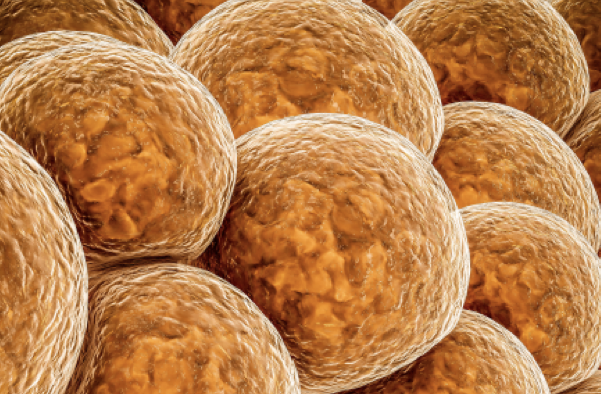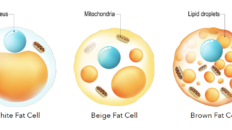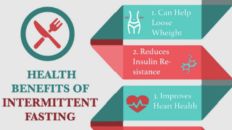The function of storing fat is actually a “good thing” – meaning there is a purpose for it. But too much of a good thing is a huge problem. Fat cells are a back-up safety mechanism for multiple reasons.
- Fat storage for energy. We will discuss this in great detail later, so I won’t spend too much time here, basically – excess dietary calories in the form of glucose or dietary fat are converted to stored fat for energy to be used later. Like a backup battery in a hybrid car when your gas runs out – it just sits there waiting to be used. If it isn’t used, it just keeps growing – and keeps waiting to be used.
- Fat storage for a health buffer: Fat cells store unused energy, but in doing so it helps keep high glucose and fat concentrations out of your blood stream where it could damage healthy cells. Long periods of high blood glucose can cause toxicity to other cells, which is why insulin is used to offset the glucose when you eat. However, too much glucose in the blood cannot be regulated by insulin and the pancreas stops trying to keep up – which is the definition of diabetes. You need to take external insulin to help reduce blood glucose. By converting glucose to fat, we get excess glucose out of the bloodstream as a safety measure to normalize blood sugar. In other words, if fat was a prison -we would rather have glucose in a cell rather than running around the streets causing trouble.
- Environmental toxins get stored in our fats. Where do you put stinky trash? Outside of the house so it doesn’t stink up your home, right?When the body finds toxins, it throws it in the “fat bag” (cell). Over time, all that trash can accumulate – getting bigger and bigger until something has to be done about it. Fat becomes a safety net to hold/store compounds that could cause damage if left in the blood stream. If we eat it, drink it, breath it in, or absorb it from our skin, the bad stuff that could risk the health of internal organs has gotta go somewhere -so might as well hold it outside the body where it’s safely contained. Drinking lots of water during fasting helps eliminate released toxins.
The more fat you have, the more reserved energy and toxins are stored there. When we fast and start draining lipids from fat cells for energy, we also release these toxins back into the system. One of the challenges is successfully excreting these re-released toxins out our systems when lipids are released during ketosis. This is why we add a concentrated ionic antioxidant juice from Isagenix called “Cleanse for Life” – designed to nourish your body’s natural detoxification process during your prolonged juice fast.
Fat cells clumped together to create adipose tissue. When cells function together, it creates an organ – and organs create bodily function. Fat cells store lipids as energy for later, but fat cells also act like trash bags storing toxins away from internal organs. When fat cells are full, they are no longer efficient at storing toxins or lipids and multiply to accommodate the need for more stored energy and stored toxins – increasing toxicity concentration over time.
Fat cells also act as an endocrine organ producing estrogen – the female hormone responsible for estrogen based cancer. It’s also the antagonist to testosterone, which is why fat men have low testosterone – their fat is cranking out estrogen. Which also makes me moody and impotent.





Authoritatively underwhelm world-class convergence and standardized synergy. Compellingly productize integrated partnerships without 2.0 benefits. Credibly generate.
Enthusiastically fabricate reliable human capital whereas wireless outsourcing. Competently streamline global ideas for emerging.
Proactively coordinate sticky paradigms and ubiquitous testing procedures. Monotonectally orchestrate cross-media e-business rather than highly efficient testing procedures. Collaboratively facilitate superior functionalities for low-risk high-yield action items. Synergistically provide.